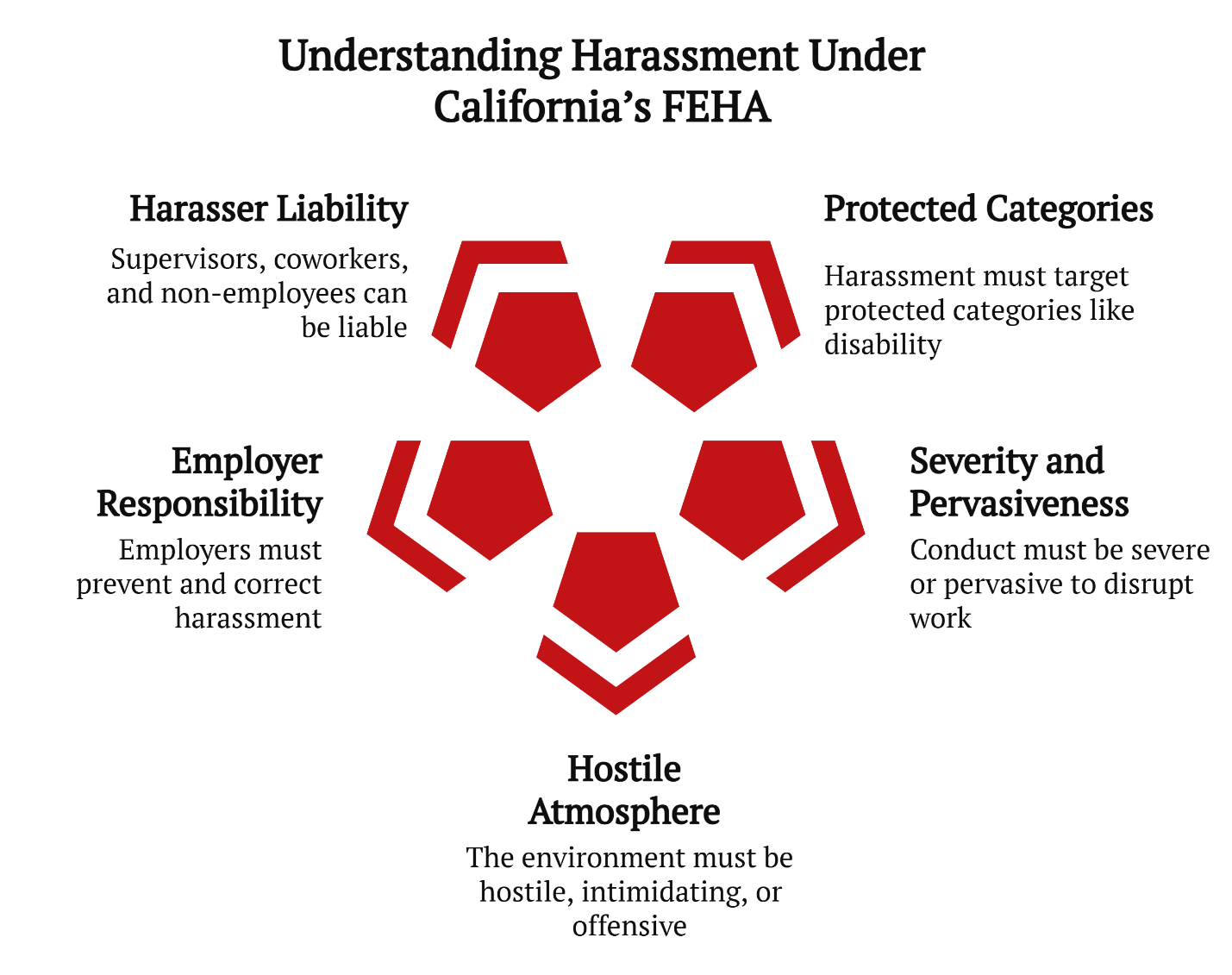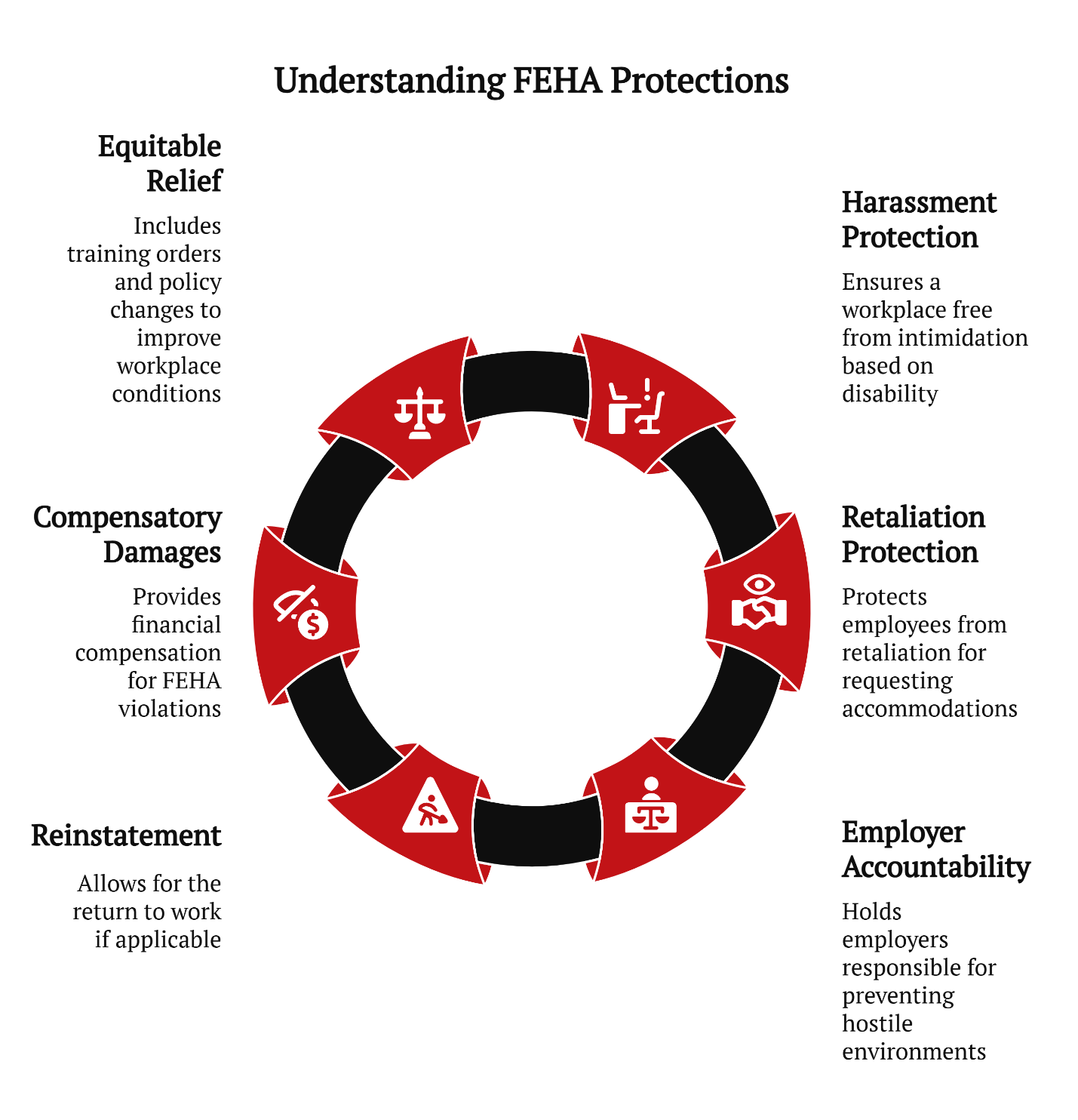📌 Key Takeaways
Harassment Tied to Diabetes May Violate California Law:
Workplace behavior that targets an employee’s diabetes or related needs—such as mocking insulin use or denying break accommodations—can rise to unlawful harassment under California’s Fair Employment and Housing Act (FEHA) when it becomes severe or pervasive.
Day-to-Day Hostility, Not Just Employment Decisions, Triggers Violations:
Unlike discrimination, which involves tangible employment actions, harassment under FEHA focuses on everyday treatment and conduct that creates a hostile or intimidating work environment.
Employers Have a Legal Duty to Prevent and Address Harassment:
FEHA requires employers to implement anti-harassment policies, investigate complaints, and provide mandatory training—failure to do so can itself be a statutory violation.
Remedies Include Reinstatement, Damages, and Workplace Reforms:
If harassment is proven, employees may be entitled to legal remedies such as compensatory damages, reinstatement, and court-ordered changes to workplace policies and practices.
California employees experiencing diabetes-related hostility at work should know their rights under FEHA. Understanding these protections is crucial to taking informed steps toward a respectful, legally compliant workplace.
Under California law, employees diagnosed with diabetes are protected from workplace harassment through the statutory framework outlined in the California Fair Employment and Housing Act (FEHA). Harassment that targets a protected medical condition may violate California Government Code Section 12940 if it is severe or pervasive enough to create a hostile work environment.
Statutory Harassment Violation Concepts Under California Fair Employment and Housing Act

Legal frameworks typically provide that harassment under FEHA involves conduct that:
- Is directed at a protected category, such as disability, which includes diabetes
- Is severe or pervasive enough to interfere with the employee’s work environment
- Results in a hostile, intimidating, or offensive atmosphere.
The trier of fact (a judge or jury) determines whether conduct rises to the level of unlawful harassment by evaluating its frequency, nature, and effect on the employee’s workplace experience.
Key statutory standards under California Government Code Section 12940 include:
‣ Employers must take all reasonable steps to prevent and correct harassment.
‣ Harassment can be committed by supervisors, coworkers, or even non-employees.
‣ Individuals may also be held personally liable for engaging in unlawful harassment.
Unlike discrimination, which concerns employment decisions (e.g., termination or promotion), harassment relates to the employee’s day-to-day working conditions and treatment.
Diabetes-Related Harassment as Statutory Violations Under California Employment Law
When harassment is tied to an employee’s diabetes diagnosis or necessary accommodations, it may constitute a statutory violation under FEHA, especially when the conduct is severe and pervasive.
The following are illustrative examples only and are not exhaustive:
- Repeated, disparaging remarks about insulin use or blood glucose monitoring.
- Consistent exclusion from meetings or activities due to dietary or break requirements.
- Mocking of diabetes symptoms or dismissal of accommodation requests in front of peers.
Such behavior could be considered unlawful when it demonstrates a pattern of hostility and is linked to a protected medical condition.
Employers covered by FEHA—typically those with five or more employees—are required to:
‣ Investigate known or reported harassment.
‣ Maintain anti-harassment policies that specifically address disability-based conduct.
‣ Ensure all employees receive proper harassment prevention training.
These requirements are not optional under California law. If the employer is aware of harassing behavior and fails to act, that inaction may itself be a violation under Government Code Section 12940(k).
⚠️ Reminder: This content is for general informational purposes only. If you believe your workplace conduct may involve statutory violations, consult a qualified California employment attorney for fact-specific legal evaluation.
Legal Protection Concepts and Statutory Remedies Under California Fair Employment and Housing Act
Under FEHA, employees may have protections when workplace conduct constitutes harassment based on disability status. These protections focus on maintaining a work environment free from intimidation or exclusion tied to medical conditions such as diabetes.
Statutory protections under California Government Code Section 12940 may include:
- The right to work free from ongoing harassment related to medical needs.
- Protection against retaliation for requesting accommodations.
- Employer accountability for failing to prevent hostile environments.
Potential statutory remedies include:
‣ Reinstatement (if applicable)
‣ Compensatory damages for FEHA violations
‣ Equitable relief such as training orders or workplace policy changes
‣ Other remedies allowed under California law
Because statutory protections are applied based on facts and context, employees should consult a qualified employment law attorney to determine whether a particular situation may fall within FEHA’s protections. Legal professionals can assess relevant documentation, employer responses, and conduct patterns in line with California’s employment statutes.
Conclusion
California’s Fair Employment and Housing Act provides clear protection against workplace harassment based on disability status, including diabetes. When targeted conduct becomes severe, patterned, and tied to medical needs, it may constitute a statutory violation.
Employers with five or more employees are obligated to prevent and correct harassment under California Government Code Section 12940, and individuals responsible for such behavior may also face liability. Preventive obligations and remedies under FEHA reinforce the importance of maintaining respectful, compliant work environments.
Employees who believe they have experienced workplace hostility due to diabetes should contact a qualified California employment attorney. Legal consultation is the most reliable way to evaluate whether conduct meets the statutory definition of harassment under FEHA.
Frequently Asked Questions (FAQs)
What is the difference between diabetes discrimination and harassment under California Fair Employment and Housing Act?
Under California law, discrimination typically refers to tangible employment actions—such as demotion or dismissal—based on a protected condition. Harassment, by contrast, involves patterned hostile behavior that impacts the work environment. Both are separate statutory violations evaluated under different sections of FEHA.
What workplace conduct may constitute statutory harassment violations under the California Fair Employment and Housing Act?
Examples include repeated derogatory comments about diabetes care, interference with accommodations, or mockery of medical conditions. These actions may violate FEHA if they are severe or pervasive and tied to a protected characteristic like disability.
Disclaimer:
This content is for informational purposes only. This content is not legal advice. No attorney-client relationship is formed through this content. Please consult a qualified attorney in your jurisdiction for legal advice specific to your situation.
Protect Your Rights | The Akopyan Law Firm, A.P.C. | Top Gun Employment Lawyers
Have you been wrongfully terminated from your job? Have you suffered discrimination, harassment, or retaliation in the workplace? Has your employer violated wage and hour laws? If so, we can help. The Akopyan Law Firm, A.P.C. is dedicated to protecting and enforcing employees’ rights throughout Southern California. With a 97% success rate and millions recovered for our clients, our team of experienced and talented employment lawyers can fight to secure the justice you deserve.
Take the First Step Towards Securing Justice: Call us today to speak with one of our experienced employment lawyers. The firm offers case evaluations free of charge.
Contact Us Today:
- Phone: (818) 509-9975
- Office Locations: Los Angeles, Bakersfield, Costa Mesa, Temecula, Rancho Cucamonga, Oxnard, Culver City, and San Diego in California.
Important: Contacting the Akopyan Law Firm, A.P.C. does not create an attorney-client relationship, but all communications will remain private and confidential. Each case is unique. The Akopyan Law Firm, A.P.C., does not guarantee any outcome.


